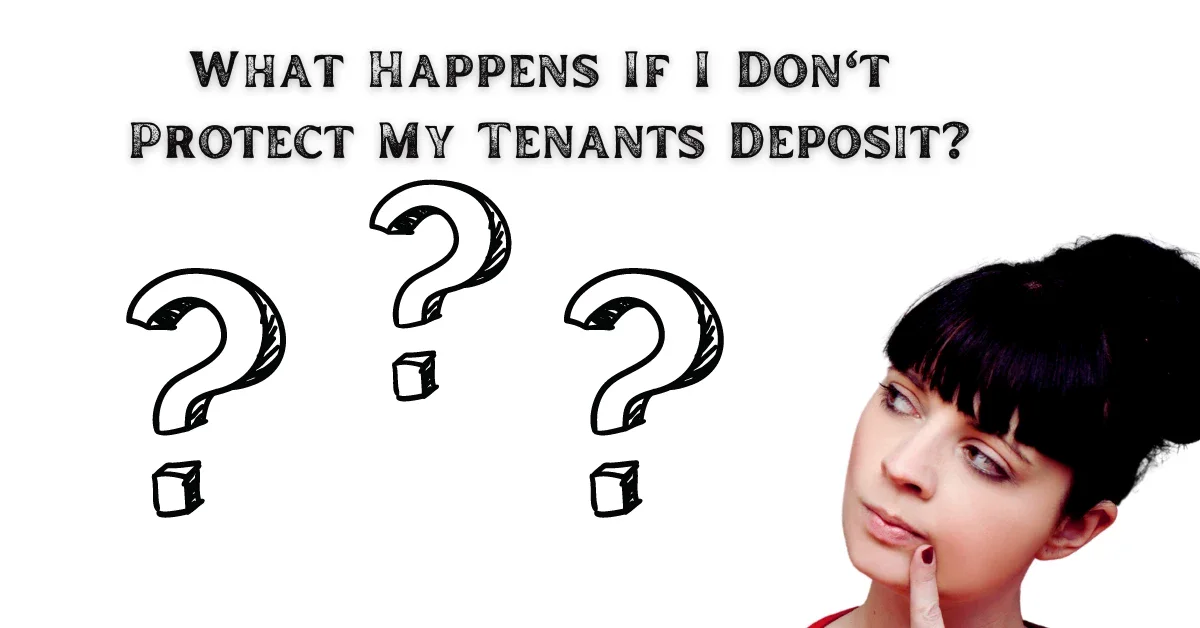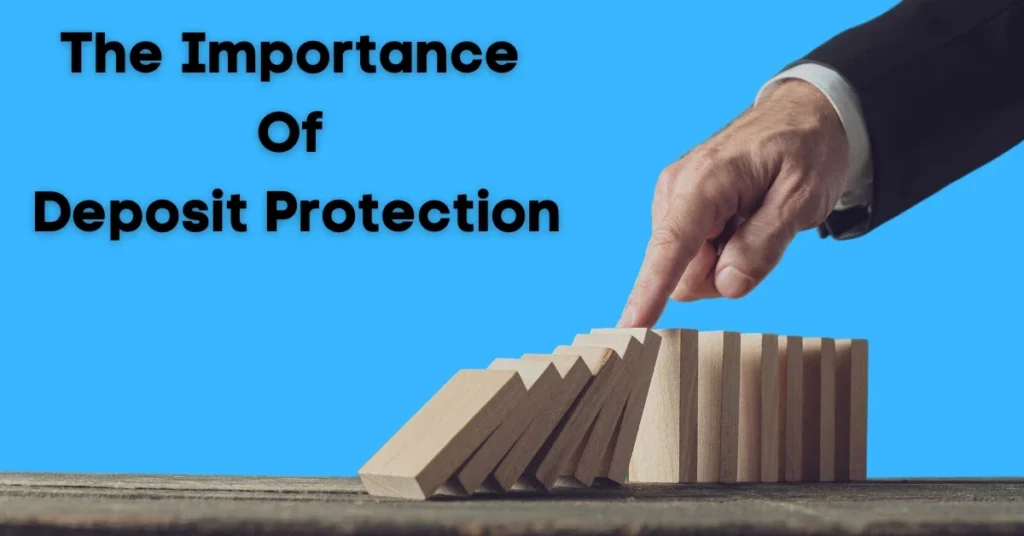Failing to protect your tenant’s deposit can result in a legal penalty and a loss of credibility as a landlord. This can result in your tenants losing trust in you and damaging your rental business reputation.
As a landlord, not protecting your tenant’s deposit can cause legal consequences and adversely impact your reputation. In the UK, landlords are required to place deposits in a government-approved tenancy deposit protection (tdp) scheme.
Failure to comply with this may lead to legal sanctions, including fines and the loss of your ability to evict tenants.

The Importance Of Deposit Protection
As a landlord, you are responsible for protecting your tenant’s deposit, which is a sum of money paid upfront at the start of a tenancy agreement.

Failing to protect the deposit can result in legal disputes and financial penalties.
Let’s explore the significance of deposit protection and why it’s essential for both landlords and tenants.
Brief Explanation Of What Deposit Protection Is
Deposit protection is a government-approved scheme designed to safeguard tenants’ deposits paid to private landlords and letting agents.
There are three types of deposit protection schemes approved by the government: custodial, insurance-based, and a combination of the two.
Once a tenant’s deposit is collected, a landlord had 30 days to protect the deposit in one of the three schemes, or they could face significant financial penalties.
Here are the key takeaways you need to know about deposit protection schemes:
- The landlord must protect the deposit within 30 days of receiving it.
- Three government-approved deposit protection schemes exist.
- Two options are insurance-based and one is custodial.
- By joining one of the schemes, the tenant’s deposit is covered by an independent body.
Why Deposit Protection Is Important For Tenants And Landlords Alike
Deposit protection serves as a safeguard for both parties involved in a tenancy agreement. It’s critical for tenants to know that their deposit is properly protected.

If a landlord doesn’t protect the deposit, the tenant has the right to sue them in court for up to three times the deposit amount.
On the other hand, landlords have a legal obligation to secure the deposit to avoid disputes and costly legal action.
Here are the reasons why deposit protection is essential for tenants and landlords:
- Protects tenants from rogue landlords who could withhold their deposit unfairly.
- Landlords can avoid disputes that arise from deposit deductions.
- Tenants can get their deposit back in full at the end of the tenancy when they meet the terms of the agreement.
- A legal requirement for landlords to protect the deposit from the start of the tenancy.
Legal Requirements For Landlords To Protect Tenant Deposits
Landlords must adhere to legal obligations when it comes to deposit protection to avoid financial and legal implications.
They should choose the relevant government-approved scheme, register the tenant’s deposit within 30 days, and provide the tenant with information about the scheme.
Landlords must also return the deposit at the end of the tenancy if there are no disputes.
Here are the legal requirements for landlords to protect their tenant’s deposit:
- Join a government-approved deposit protection scheme within 30 days of receiving it.
- Provide the tenant with the prescribed information within 30 days of receipt of the deposit.
- Return the deposit to the tenant within 10 days of both parties agreeing on the amount.
- Store the deposit safely and pay any interest accrued to the tenant when they move out.
Deposit protection is essential for both landlords and tenants, serving as a legal obligation to avoid unnecessary disputes and penalties.
Choose the most suitable government-approved scheme, secure your tenant’s deposit within 30 days, and abide by the legal obligations for a smooth and successful tenancy.
Consequences Of Not Protecting Tenant Deposits
As a landlord, it’s crucial to safeguard your tenant’s deposit to avoid any disputes at the end of the tenancy.
However, some landlords fail to realize the importance of deposit protection, which can lead to severe consequences.
Let’s explain the consequences of not protecting tenant deposits appropriately.
According to the law, landlords are required to protect their tenant’s deposits under a government-approved tenancy deposit protection (tdp) scheme.
If you fail to comply with this regulation, you may face hefty penalties, which may have a significant impact on your finances.
Below are some of the penalties you may face:
- A fine of up to 3 times the deposit amount from the court
- A requirement to repay the deposit in full before seeking possession of the property.
- A prohibition from serving a section 21 notice (eviction notice) to the tenant.
- A possibility of imprisonment in severe cases.
Potential Legal Action And Financial Repercussions
Not only can you face penalties, but failing to protect your tenant’s deposit may also result in legal action and financial repercussions. Here are some of the most significant risks:
- Your tenant may take legal action against you for failing to protect their deposit, potentially costing you thousands of pounds in legal fees and compensation payments.
- You may lose your right to possession of the property and may have to pay the tenant’s costs if they succeed with a counterclaim.
- You’ll receive a bad reputation online and offline, leading to difficulty in finding new tenants and losing current ones.
Negative Impact On Landlord Reputation
Landlords who fail to protect their tenant’s deposits often receive negative reviews online, leading to a bad reputation and difficulty in finding new tenants.
Here are some of the ways your reputation can be affected:
- Negative reviews on landlord review websites can deter prospective tenants from renting your property.
- Your tenant may leave negative reviews on social media, warning others not to deal with you.
- Local letting agents may blacklist you, making it difficult to secure new tenants.
Failing to protect your tenant’s deposit can lead to severe repercussions, including penalties, legal action, financial repercussions, and a negative impact on your landlord’s reputation.
Therefore, it’s essential to comply with the law and protect your tenant’s deposit under a top scheme.
Frequently Asked Questions For What Happens If I Don’T Protect My Tenants Deposit
What Is A Tenant’S Deposit?
A tenant’s deposit is a sum of money paid to the landlord before moving into a rental property as a security in case of any damage or unpaid rent.
What Happens If I Don’T Protect My Tenant’S Deposit?
If you don’t protect your tenant’s deposit, you can face legal consequences and be ordered to pay your tenant up to three times the deposit amount.
How Can I Protect My Tenant’S Deposit?
You can protect your tenant’s deposit by placing it in a government-approved tenancy deposit scheme within 30 days of receiving it, providing your tenant with the necessary information about the scheme.
Can I Deduct Money From My Tenant’S Deposit?
You can only deduct money from your tenant’s deposit if there’s damage beyond normal wear and tear or unpaid rent. You must provide evidence of the damage and/or unpaid rent.
Conclusion
Ignoring the rules around your tenants’ deposit puts you in hot water legally, potentially leading to hefty fines.
As a landlord, it’s vital you protect your tenant’s deposit correctly and promptly – it’s not just the law, but a cornerstone of trust in your relationship. Don’t risk it!
Reference
https://www.gov.uk/tenancy-deposit-protection/if-your-landlord-doesnt-protect-your-deposit
